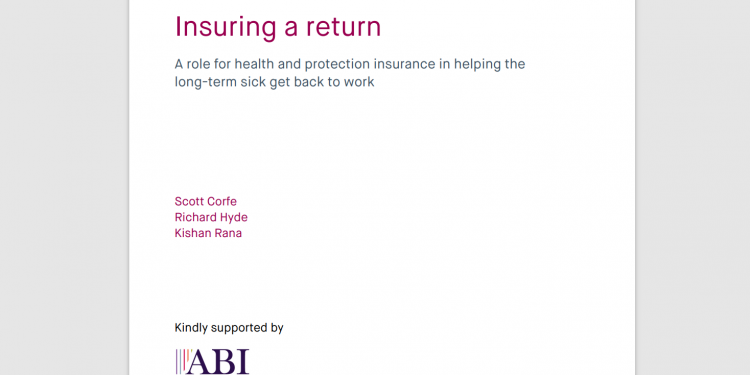Insurers should communicate the benefits of health cover more effectively to companies and individuals alike, access better data on the societal benefits of health and protection insurance and improve product innovation to attract more SME customers.
These are some of the key recommendations from a Insuring a return – a report commissioned by the Association of British Insurers (ABI) and carried out by the Social Market Foundation.
Recommendations for insurers
The report contains a number of key recommendations for the insurance sector following on from the research.
It calls on insurers to do more to clarify the nature and purpose of health insurance products after identifying a “substantial” understanding gap between what the industry devises and promotes its products for and the motivations behind many employers’ reasons for purchasing them.
The report also recommends the insurance industry identify ways it can improve its current stock of data, to better illuminate potential health and wider societal benefits of health and protection insurance products.
It argues that more detailed information on the possible causality between insurance services provided and health and return-to-work outcomes, would help to build a more compelling case for the role of insurance in tackling illness, injury and presenteeism in the workplace.
Specific examples of useful data include measures of the relative quality of private healthcare treatment versus NHS treatment, for example in terms of speed of returning to good health and operation success rates.
And it suggests data demonstrating the role that prevention services – such as annual health checks for staff – can play in reducing sickness rates and presenteeism would also be valuable in helping to convey to businesses how insurance can improve health.
And in order for the industry to sustain itself and expand into markets such as the SME market, the report calls on insurers to consider more product innovation.
To do this, the sector will need to tackle the real or perceived issues of cost, trust and transparency, complexity, fears over “small print” and non-pay-out of claims that pervade parts of the consumer and small business populations.
But the report also says the industry needs to adapt to expectations of greater product choice, including the trend for more tailored products and services that suit individual circumstances.
Key findings
The report drew on a range of evidence including existing studies, online surveys of employers and employees, in-depth interviews with businesses and insurance industry data.
The SMF commissioned two online surveys from Opinium – a survey of HR-decision makers in businesses, and a separate survey of individuals that had suffered a long-term absence of more than four weeks, split evenly between those with and without insurance benefits.
Additionally, the SMF conducted 35 in-depth over-the-phone interviews with businesses.
Some of the key findings from the research include:
The key motivation for businesses providing health or protection insurance is its role as an incentive and signalling tool – most crucially as a means of recruiting and retaining staff, with employers often agreeing insurance provided a signal to staff that they are ‘valued’ and some employers consider it a moral duty to provide such ‘benefits’.
Employers consider workplace health as a “second-order” benefit of products such as private medical insurance (PMI) and income protection (IP) insurance, being less commonly cited as a motivation for purchase than recruitment and retention.
Most individuals that had suffered a long-term absence from work of more than four weeks reported benefits from having access to insurance, highlighting the health benefits these products can bring.
PMI was seen as ‘indispensable’ or ‘helpful’ by 82% of respondents who were covered at the time of their absence inducing illness or injury.
Similarly, 78% reported their income protection (IP) coverage was ‘indispensable’ or ‘helpful’ to their recovery, and 76% reported that their health plan was either ‘indispensable’ or ‘helpful’ to their recovery.
Two in three of those who had critical illness cover at the time of their illness found that it was ‘indispensable’ or ‘helpful’ in their recovery.
Of those who found PMI ‘helpful’ or ‘indispensable’, the most frequently reported benefit was the swift access to care it provided closely followed by the ‘peace of mind’ that the PMI coverage gave to the recipient.
For IP, ‘peace of mind’ was the top benefit, followed by its ability to ease financial difficulties associated with absence from work.
Among businesses surveyed, cost and not considering insurance products to be relevant were the two most widely-cited reasons for not offering insurance benefits to staff.
The report concluded that the disparity between businesses often not viewing insurance as a “health product”, and employees reporting products as being beneficial in aiding their return to work following absence, suggesting that businesses might not fully understand the full range of services offered by insurers.
Recommendations to policy makers
Turning to recommendations for policy makers, the report suggests the UK could follow the Australian model of ‘nudging’ people to take out PMI or other insurance so that money from taxes can be spent meeting the health requirements of low earners.
The report also suggested the UK could reform statutory sick pay requirements by following the Netherlands which has substantially improved return-to-work rates and labour market participation through re-configuring its sick pay system, by incentivising businesses to take a more pro-active approach towards supporting ill and injured workers.
It argues sick pay structures could be reformed in the UK along similar lines – claiming as in the Netherlands, an increase in statutory sick pay should increase incentives on employers to improve workplace health and reduce absence rates.
Employees would benefit from greater financial stability in the event of sickness, and insurance can help businesses manage the costs associated with higher rates of statutory sick pay.
The report also calls for reform of long-term absence and disability and possibly even the extension of sick pay and suggests the auto-enrolment principle could be extended to sick-pay.
This could result in a co-funded (employer and employee) or sole funded (employer) insurance coverage, with the aim of creating incentives for employers and employees about what happens to them when they are sick, how much they would get and who from.
Additional benefits could be a greater health focus for employers and employees and a reduction in the state disability bill if organisations adopted a kitemarked IP solution.
Finally the report calls on policy makers to consider a simplification of tax and legislative barriers which could support wider uptake of insurance products with potential health benefits.
Options include an annual allowance for benefits-in-kind taxation so that, up to a financial threshold, receiving benefits-in-kind, for example through health insurance, is not penalised.
But policy makers have been urged to also ensure the welfare system does not penalise use of insurance, as is the case at present.
Currently about one in five recipients of Universal Credit may find their individual IP policy to be of no value in the event of absence from work due to illness or injury, because of the way IP payments interact with the Universal Credit system.
For employers, the report adds, there are challenges around P11D and how their support services impact on associated legislation and tax.






